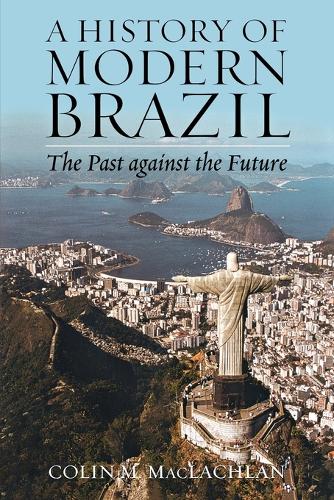
A History of Modern Brazil: The Past Against the Future
(Paperback)
Publishing Details
A History of Modern Brazil: The Past Against the Future
By (Author) Colin M. MacLachlan
Bloomsbury Publishing PLC
Rowman & Littlefield Publishers
1st August 1993
United States
Classifications
General
Non Fiction
981
Physical Properties
Paperback
262
Width 163mm, Height 232mm, Spine 18mm
454g
Description
Over time, Brazil has evolved into a well-defined nation with a strong sense of identity. From the natural beauty of the Amazon River to the exciting resort city of Rio de Janeiro, from soccer champion Pel- to classical musician Villa Lobos, Brazil is known as a distinctive, diverse country. This book provides a well-rounded, brief history of Brazil that uniquely focuses on both the politics and culture of the republic. Colin MacLachlan uses a political narrative to frame the evolution of national culture and the formation of national identity. He evaluates Brazilian myths, stereotypes, and icons such as soccer and dancing as part of the historical analysis. A History of Modern Brazil will inform and entertain students in courses on Brazil and modern Latin America.
Reviews
MacLachlan's book . . . contains interesting discussions on several things that should be, but are not always, addressed in history textsBrazil's carnival, Pentecostalism, soccer, Copacabana beach, Brazilians' love of television and music, and rain forest pharmaceuticals. Delightful and easy to read, yet surprisingly comprehensive with a decent bibliography, the book is extremely well organized with several useful maps and a few excellently chosen pictures. This will be an excellent text in classes on Brazilian history or a supplemental text on general courses in Latin American history. . . . [An] outstanding text for undergraduate courses. * Choice Reviews *
The most student-friendly history of Latin America's largest country. Unlike other histories of Brazil that narrowly focus on economics and politics, A History of Modern Brazil skillfully integrates the nation's rich cultural heritage into the historical narrative. Discussions of soccer, samba, and religion, among other cultural themes, engage students and invite them to consider Brazilian history in its totality. In short, Professor MacLachlan's fascinating book belongs on the shelves of all students of Brazil and Latin America. -- R. Andrew Chesnut, University of Houston, author of Competitive Spirits
An insightful look at a fascinating place. In clear fashion, Colin MacLachlan deals with difficult-to-explain matters such as the reasons for the British repression of the international slave trade and the history of abolition in Brazil. Likewise, he excels in the treatment of other knotty issues, such as the 'politics of the governors' and foreign influences on nation building, and does so in a manner that students will understand and appreciate. -- Todd A. Diacon, University of Tennessee
A welcome addition to the now-crowded field of Brazilian history textbooks. It sets a new standard in this often staid genre. Students, general readers, and experts alike will find much food for thought in MacLachlan's book. The effective integration of cultural history into political and economic history makes it especially attractive for classroom use. Bossa nova, Carnival, Pentecostalism, soccer, Copacabana Beach, radio, and television all take their rightful places alongside the standard topics of modern Brazilian political history such as the Old Republic, Tenetismo, Getulio Vargas, the military regime, and democratization. Engaging discussions of political economy, notable the establisment of the automobile industry, will engage students in these usually dry topics. -- Hendrik Kraay, University of Calgary
An excellent synthesis and a much-needed text. -- Darlene J. Sadlier, Indiana University
Author Bio
Colin M. MacLachlan is the John Christy Barr Distinguished Professor of History at Tulane University and former chair of the history department. He is the author of numerous books and articles on a wide range of Latin American topics.
